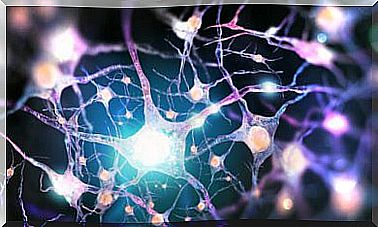Limerence, When Loving Is Hell

When certain negative circumstances converge, love ceases to be sublime. That’s when loving is hell. The truth is that many times we give the name of “love” to what is not. We basically confuse the experience of loving with that of being loved. From there are born, sometimes, those obsessions for “love” that do not give up.
There is a term that defines that state in which to love is hell. It’s called “limerence. ” The term was coined by psychologist Dorothy Tennov in 1979. She did it after conducting a long research on romantic love in which she consulted the opinion of more than 500 people.
Limerence is understood as that state of mind under which loving is hell. That is, the condition in which a person feels “in love” with another and develops an obsessive and prevailing desire to be reciprocated. This state is related to obsessive-compulsive disorder. That is why it involves great suffering for the individual.

When loving is hell
We all know that falling in love is a state characterized by the intensity of the feelings and emotions present. Not only do you feel “butterflies in your stomach”, but you also lose your critical sense and reason goes to the background. The feeling of “love” is invasive, powerful, and very rewarding. It is experienced as a “sweet suffering.”
The normal thing is that after that phase of enormous exaltation of the emotions other stages come where little by little the balance and the care of the own interests are recovered. The intensity of the feeling decreases, the rational elements are introduced and that kind of “blindness” is dissipating. When the relationship is healthy, it goes to a deeper, more real stage marked by tenderness.
In the case of limerence, the same symptoms of falling in love are experienced. However, the difference is in two aspects:
- First, that it is not the two people, but only one of them who feels all that passion.
- Finally, that in the cases in which both experience falling in love, one of the two overcomes that state, while the other does not.
In both circumstances the common element is that there is no correspondence. This brings us to a third characteristic of limerence. When it is discovered that there is no such correspondence, the person who is “in love” decides not to accept it. Therefore, you put all your effort into making the other feel the same. And he is reluctant to admit that this may not happen. In those moments, loving is hell.
Limerencia, when loving hurts
From being a pleasant and exultant feeling, love turns into torture when limerence occurs. That obsession does not allow you to live in peace for a minute. Vague and constant illusions are followed by harsh disappointments. Over and over that cycle is restarted. The person feels trapped in the loving feeling and cannot find a way to stop feeling that way.
In this way, love is lived as a negative experience, in which one suffers too much. Faced with this suffering, the person looks for a way to ensure the love of his partner, makes mistakes, thoughts of doubt and insecurity assail him. These thoughts fill the person with anxiety and concern. In those cases is when loving is hell.

Someone who experiences limerence literally cannot stop thinking about “being loved”. Sometimes he tries, but the intrusive thoughts return to his head, without being able to push them back to a corner. It also idealizes and oversizes the other. He begins to live according to the other and the possibilities with the other, thinking about how to create opportunities to meet that person and to do things that he likes.
These types of feelings also give rise to physical manifestations. The affected person may experience symptoms such as tremors, palpitations, sweating, nervousness, difficulty sleeping, etc. Everything that characterizes an obsession.
Out of the hell of limerence
What is in the background in these cases are the traits of an obsessive-compulsive personality. It is a major disorder with different consequences. In the case of limerence, the “being loved” is just a pretext to display a set of symptoms, which are related to deeper problems.
An obsessive person can fix his attention on a sport, a religion, an idea or any other type of object or reality. In the case of limerence, the emphasis is on another person and the feeling of togetherness. This obsessive approach leads to compulsive acts (automatic and irrational) and leads to many people ending up defining love as a state of hell.

In reality, love is not present there. What there is is an alteration of consciousness that may have to do with unprocessed traumatic experiences. These come from the past and have not been recognized. The supposed burning love for the other may be nothing more than a smokescreen to keep that debt to oneself hidden. If so, a visit to the psychologist is mandatory.









